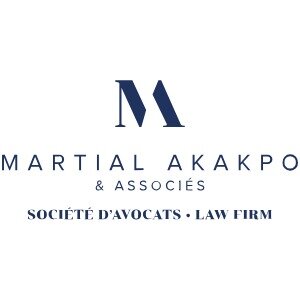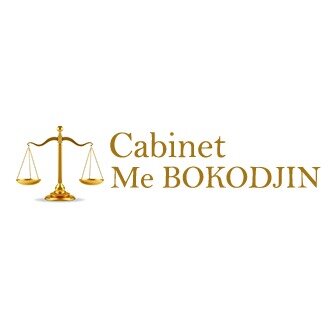Best Financial Services Regulation Lawyers in Togo
Share your needs with us, get contacted by law firms.
Free. Takes 2 min.
Or refine your search by selecting a city:
List of the best lawyers in Togo
About Financial Services Regulation Law in Togo
Financial services regulation in Togo is primarily governed by a set of laws and regulations that aim to ensure the stability and integrity of the financial sector. These regulations are crucial for protecting consumers, ensuring sound financial practices, and fostering a healthy economic environment. The regulatory framework typically involves oversight of banking, insurance, securities, and other financial services, and is designed to prevent financial crimes, promote transparency, and ensure compliance with regional and international standards.
Why You May Need a Lawyer
There are several situations where you might need a lawyer specializing in financial services regulation in Togo. These include: navigating complex compliance requirements, setting up a new financial institution, defending against allegations of regulatory non-compliance, needing representation in disputes related to financial transactions, and seeking guidance on investments and financial agreements under Togolese law. A lawyer can provide you with crucial advice and representation, ensuring that your actions are within the bounds of the law, and helping to safeguard your financial interests.
Local Laws Overview
The financial regulatory landscape in Togo is influenced by both national laws and regional directives, particularly from the West African Economic and Monetary Union (WAEMU), to which Togo is a member. Key aspects of local laws include strict guidelines for the licensing and operation of banks and financial institutions, anti-money laundering (AML) and counter-terrorist financing (CTF) regulations, consumer protection laws in financial transactions, and the requirement for transparency and reporting standards. Financial institutions are closely monitored by the Central Bank of West African States (BCEAO), which plays a crucial role in ensuring that institutions adhere to established regulations.
Frequently Asked Questions
What is the role of BCEAO in Togo's financial sector?
The BCEAO is the central bank for the eight countries in the WAEMU, including Togo. It regulates monetary policy, oversees financial institutions, and ensures compliance with regional financial standards.
What are the penalties for non-compliance with financial regulations in Togo?
Penalties can include fines, revocation of licenses, and even imprisonment, depending on the severity and nature of the infringement.
Can foreign banks operate in Togo?
Yes, foreign banks can operate in Togo, but they must comply with both national and regional regulations, including obtaining the necessary licenses.
How are consumer interests protected in financial transactions?
Consumer protection is enforced through laws that mandate transparency in terms and conditions, fair treatment, and recourse for grievances. The regulations are in place to ensure consumers are not exploited by financial service providers.
What is required to set up a financial institution in Togo?
Setting up a financial institution in Togo requires compliance with licensing requirements, capital adequacy norms, and adherence to operational guidelines set by the BCEAO and national regulators.
How does Togo prevent financial crimes such as money laundering?
Togo adheres to AML and CTF strategies outlined by regional and international bodies, requiring financial entities to implement certain controls and report suspicious activities.
Is there a regulatory body for financial services in Togo?
Yes, financial services are regulated by both the Togolese Ministry of Economy and Finance and the BCEAO, which closely monitor and enforce financial regulations.
What should I do if I have a complaint against a bank or financial institution?
Complaints should first be addressed with the institution directly. If unresolved, you can escalate the issue to the regulatory body overseeing financial services.
Are cryptocurrency transactions regulated in Togo?
Cryptocurrency transactions are currently not heavily regulated, but the government is observing developments and may introduce regulations to manage their use in the future.
How does one become a licensed financial advisor in Togo?
Becoming a licensed financial advisor typically requires meeting educational and professional criteria and obtaining certification from relevant regulatory bodies.
Additional Resources
For more information and assistance, consider reaching out to the Togolese Ministry of Economy and Finance, the Central Bank of West African States (BCEAO), and legal associations such as the Togolese Bar Association. These organizations can provide guidance, updates on regulatory changes, and contacts for reputable legal professionals specializing in financial services regulation.
Next Steps
If you need legal assistance in financial services regulation, start by identifying your specific need for legal advice. Collect all relevant documents and information pertaining to your situation. Then, consider consulting a local lawyer who specializes in financial regulation, ensuring they are familiar with both national and WAEMU frameworks. Finally, prepare to discuss your case in detail to receive tailored advice and representation. A proactive approach will help you navigate the complexities of financial regulation in Togo effectively.
Lawzana helps you find the best lawyers and law firms in Togo through a curated and pre-screened list of qualified legal professionals. Our platform offers rankings and detailed profiles of attorneys and law firms, allowing you to compare based on practice areas, including Financial Services Regulation, experience, and client feedback.
Each profile includes a description of the firm's areas of practice, client reviews, team members and partners, year of establishment, spoken languages, office locations, contact information, social media presence, and any published articles or resources. Most firms on our platform speak English and are experienced in both local and international legal matters.
Get a quote from top-rated law firms in Togo — quickly, securely, and without unnecessary hassle.
Disclaimer:
The information provided on this page is for general informational purposes only and does not constitute legal advice. While we strive to ensure the accuracy and relevance of the content, legal information may change over time, and interpretations of the law can vary. You should always consult with a qualified legal professional for advice specific to your situation.
We disclaim all liability for actions taken or not taken based on the content of this page. If you believe any information is incorrect or outdated, please contact us, and we will review and update it where appropriate.
Browse financial services regulation law firms by city in Togo
Refine your search by selecting a city.











